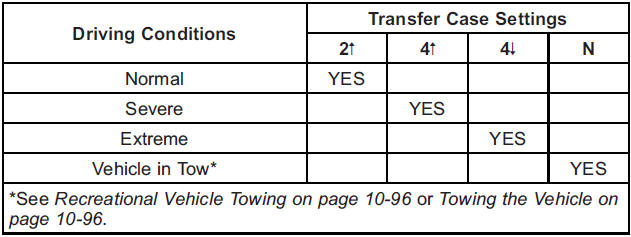Recommended Transfer Case Settings

Notice: Driving on clean, dry pavement in four-wheel drive for an extended period of time can cause premature wear on the vehicle's powertrain. Do not drive on clean, dry pavement in Four-Wheel Drive for extended periods of time.
4  (Four-Wheel Drive Low): This setting also engages the front axle and delivers extra torque. You may never need Four-Wheel Drive Low.
(Four-Wheel Drive Low): This setting also engages the front axle and delivers extra torque. You may never need Four-Wheel Drive Low.
It sends maximum power to all four wheels. You might choose Four-Wheel Drive Low if you are driving off-road in deep sand, deep mud, deep snow, and while climbing or descending steep hills.
If the vehicle has StabiliTrak®, shifting into Four-Wheel Drive Low will turn Traction Control and StabiliTrak off. See StabiliTrak® System on page 9‑59.

A parking brake symbol is located next to the N (Neutral) symbol as a reminder to set the parking brake before shifting the transfer case into N (Neutral).
WARNING
Shifting the transfer case to N (Neutral) can cause the vehicle to roll even if the transmission is in P (Park). You or someone else could be seriously injured. Be sure to set the parking brake before placing the transfer case in N (Neutral). See Parking Brake on page 9‑58.
N (Neutral): Shift to this setting only when the vehicle needs to be towed. See Recreational Vehicle Towing on page 10‑96 or Towing the Vehicle on page 10‑96.
2  (Two-Wheel Drive High): This setting is used for driving in most street and highway situations.
(Two-Wheel Drive High): This setting is used for driving in most street and highway situations.
The front axle is not engaged in two-wheel drive. This setting also provides the best fuel economy.
4  (Four-Wheel Drive High): Use this setting when you need extra traction, such as on snowy or icy roads or in most off-road situations.
(Four-Wheel Drive High): Use this setting when you need extra traction, such as on snowy or icy roads or in most off-road situations.
This setting also engages the front axle to help drive your vehicle. This is the best setting to use when plowing snow.
You can shift from Two-Wheel Drive High to Four-Wheel Drive High or Four-Wheel Drive High to Two-Wheel Drive High while the vehicle is moving. In extremely cold weather, it may be necessary to stop or slow the vehicle to shift into Four-Wheel Drive High.
See also:
Cleaning Exterior Lamps/ Lenses and Emblems
Use only lukewarm or cold water, a soft cloth, and a car washing soap to clean
exterior lamps and lenses. Follow instructions under "Washing the Vehicle" later
in this section. ...
Safety
All-disc antilock brakes and daytime running lights are standard, but
side-impact airbags are not available. ...
Muting a Call
During a call, all sounds from inside the vehicle can be muted so that the person
on the other end of the call cannot hear them.
To mute a call, press , and then
say “Mute Call.”
To cancel m ...





